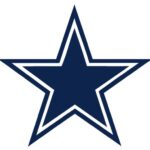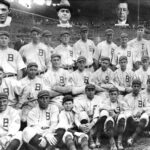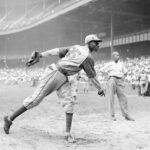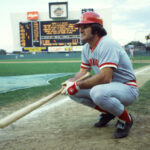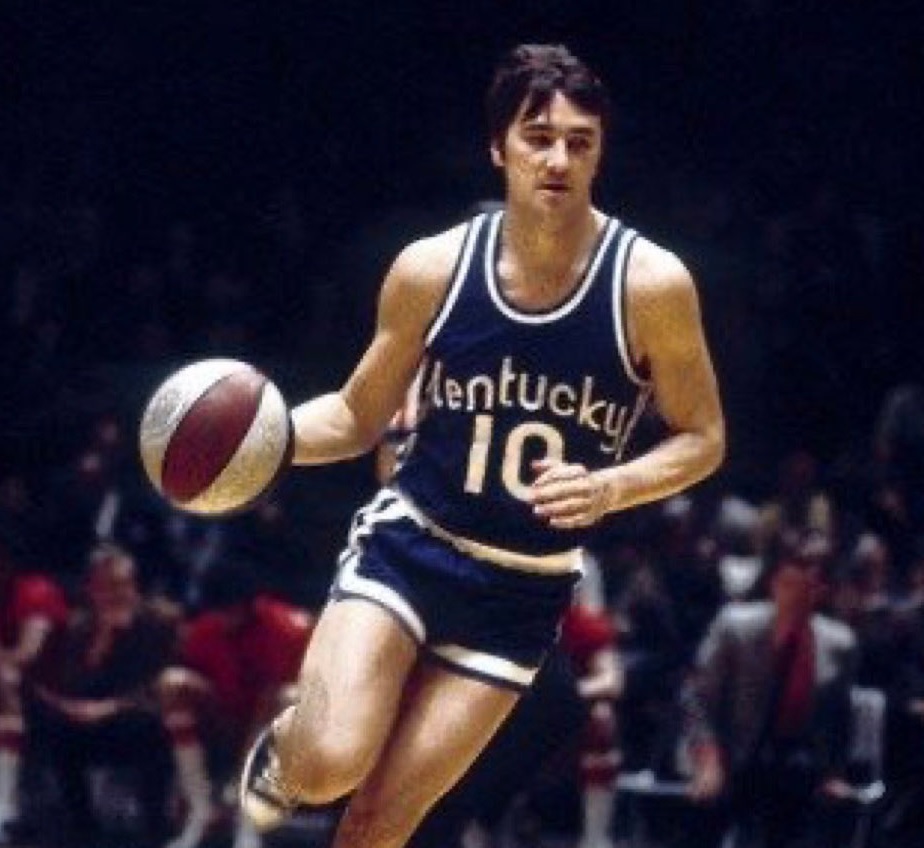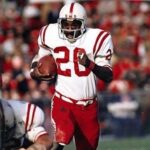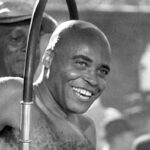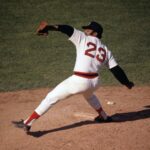Counting Down the Greatest Offensive Performances in Super Bowl History
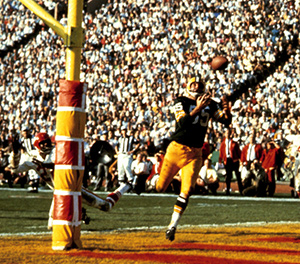
Max McGee caught more passes in Super Bowl I than he did during the entire 1966 season.
Sunday’s Super Bowl will feature a budding star quarterbacking one squad and an aged gunslinger likely facing his final showdown on the other. While we tend to focus on Cam Newton and Peyton Manning, the reality is that victory in the Super Bowl will likely hinge on the performance of someone far less known than either starting quarterback.
Super Bowl history includes a mixture of Hall of Fame players rising to the occasion on the biggest stage of the game and second tier players who picked the Super Bowl to have a career day.
This article marks part two of our look at the top 50 individual offensive performances in Super Bowl history. Of the 50 performances picked for the list, 32 were by players who either are in the Hall of Fame or should realistically expect to receive a bust in Canton at some point. However, when you look at the “best of the best” performances, 19 of the top 25 were by players who are Hall of Fame caliber.
Here is a look at our picks for the 25 best individual offensive performances in Super Bowl history. For this list we looked at statistics, but also considered game situations. That is why the Super Bowl where Joe Montana threw 5 touchdowns was highlighted in the first look at performances 50-26, but his most clutch performance is featured here. We did take into account whether the team won the game, but did not give any weight to who won the game MVP Award as there have been many occasions where you can scratch your head at who received that award.
Be sure to check out part 1 with numbers 50-26. I welcome your comments or ideas as to which performances you think should be on this list.
25. Max McGee – Green Bay Packers – Super Bowl I – 7 rec., 138 yards, 2 TD
It was no surprise that the Green Bay Packers defeated the Kansas City Chiefs in the first Super Bowl, but it was quite a shocker that one of the stars of the game was aging wide receiver Max McGee. Having caught just four passes in limited action during the season, McGee expected his biggest score of the weekend to be when he broke curfew the night before the game. Yet, after Boyd Dowler suffered a broken collar bone in the first minutes, McGee made history by scoring the first touchdown in Super Bowl history.
24. Kurt Warner – St. Louis Rams – Super Bowl XXXIV – 24-45, 414 yards, 2 TD, 0 INT
Before the 1999 season Kurt Warner had thrown all of 11 passes in the NFL. In Super Bowl XXXIV he threw the ball 45 times for 414 yards (still the single game Super Bowl record) to lead the Rams to a 23-16 victory over the Tennessee Titans. The Rams marched up and down the field, but were held to just three field goals in the first half and the Titans came all the way back to tie the score at 16. Warner then connected with Isaac Bruce for a 73-yard touchdown that proved to be the game winner.
23. Eli Manning – New York Giants – Super Bowl XLVI – 30-40, 296 yards, 1TD, 0 INT
With his team trailing 17-9 after the New England Patriots scored on the first drive of the second half, Eli Manning completed 17 of 23 passes for 176 yards to lift the New York Giants to their second Super Bowl victory over the Patriots in five years. He was especially impressive when marching the Giants down for the game-winning touchdown as he completed five of six passes for 74 yards.
22. John Elway – Denver Broncos – Super Bowl XXXIII – 18-29, 336 yards, 1TD, 1INT; 1 rushing TD
In his final NFL game, John Elway went out in style by passing for 336 yards and a touchdown and scoring another touchdown on the ground as the Broncos won their second straight Super Bowl. The Broncos seized control early with Elway’s 80-yard touchdown pass to Rod Smith giving them a 17-3 lead.
21. Emmitt Smith – Dallas Cowboys – Super Bowl XXVIII – 30 rushes, 132 yards, 2 TD; 4 rec., 26 yards
With Super Bowl XXVIII tied at 13-13 early in the second half, the Dallas Cowboys strapped their fortunes to the back of Emmitt Smith as he ran the ball on seven of eight plays to gain 61 yards and scored what proved to be the game-winning touchdown. He scored his second touchdown in the fourth period to seal the victory.
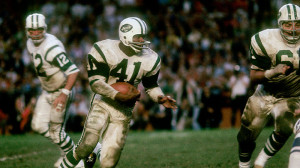
The Baltimore Colts could not stop Matt Snell in Super Bowl III.
20. Matt Snell – New York Jets – Super Bowl III – 30 rushes, 121 yards, 1 TD; 4 rec., 40 yards
I think Joe Namath was deserving of being MVP of Super Bowl III, but I also think it is highly unlikely that the Jets would have won the game without Matt Snell. He rushed for 74 yards and a touchdown in the first half and then helped seal the win with some first down runs as the Jets ran down the clock in the second half.
19. Terrell Davis – Denver Broncos – Super Bowl XXXII – 30 rushes, 157 yards, 3 TD
Despite being hampered by a migraine headache, Terrell Davis inflicted more pain on the Green Bay Packers as he rushed for 157 yards and became the first (and to date only) running back to rush for three touchdowns in a Super Bowl. The victory helped longtime quarterback John Elway win his first Super Bowl in four tries, but it was Davis who had the more pivotal performance.
18. Bart Starr – Green Bay Packers – Super Bowl I – 16-23, 250 yards, 2 TD, 1 INT
The bar for Super Bowl greatness was set very high in the first Super Bowl as Bart Starr sealed his legacy as one of the greatest winners in NFL history with a strong performance against the Kansas City Chiefs. Though he lost one of his starting receivers in the first series, Starr turned little used Max McGee into a Super Bowl hero while keeping the Packers moving down the field. Starr and the Packers returned for the second Super Bowl with the quarterback earning his second Super Bowl MVP award.
17. Joe Namath – New York Jets – Super Bowl III – 17-28, 206 yards, o TD, o INT
The performance by Joe Namath in Super Bowl III was not the greatest in the 48 year history of the game, but it was arguably the most important. In an era when the quarterbacks called their own plays, Namath did a masterful job mixing the pass and run to totally neutralize the great Baltimore Colts defense. The result was an upset that solidified the Super Bowl as a true national sporting event.
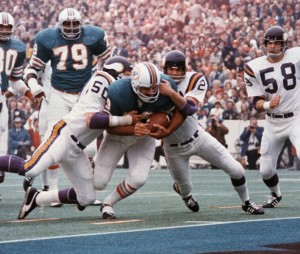
Larry Csonka‘s 33 attempts, 145 yards and 2 TDs are a major reason that the Dolphins had to attempt only seven passes in Super Bowl VIII.
16. Larry Csonka – Miami Dolphins – Super Bowl VIII – 33 rushes, 145 yards, 2 TD
It is particularly impressive when a team can come into a Super Bowl with a game plan and then execute it perfectly. In Super Bowl VIII the Miami Dolphins were committed to the run and for four quarters pounded the Minnesota Vikings into submission. Leading the way was fullback Larry Csonka, who pounded the ball 33 times for a then Super Bowl record and two touchdowns. The Dolphins were so dominant running the football that quarterback Bob Griese attempted only seven passes in the entire contest.
15. Franco Harris – Pittsburgh Steelers – Super Bowl IX – 34 rushes, 158 yards, 1 TD
A year after Larry Csonka and the Dolphins ran over the Minnesota Vikings defense, Franco Harris and the Pittsburgh Steelers did the same thing. Harris broke Csonka’s Super Bowl record by rushing for 158 yards in the first of the Steelers four Super Bowl victories in the decade.
14. Joe Flacco – Baltimore Ravens – Super Bowl XLVII – 22-33, 287 yards, 3 TD, 0 INT
The Baltimore Ravens were known for their defense, but Joe Flacco and the offense took control early in Super Bowl XLVII. Flacco tossed three touchdown passes in the first half and then orchestrated a time-consuming drive in the fourth quarter to lift the Ravens to a 34-31 victory over the San Francisco 49ers.
13. Tom Brady – New England Patriots – Super Bowl XXXVIII – 32-48, 354 yards, 3 TD, 1 INT
Tom Brady orchestrated the second Super Bowl-winning field goal drive of his career to defeat the Carolina Panthers 32-29. Brady tossed a pair of first half touchdown passes and then after the game was tied 29-29 led the Patriots on a final game-winning drive. His 354 passing yards are the sixth highest total in Super Bowl history.
12. Aaron Rodgers – Green Bay Packers – Super Bowl XLV – 24-39, 304 yards, 3 TD 0 INT
Aaron Rodgers and the Green Bay Packers entered Super Bowl XLV on a roll and remained hot as they bolted to a 21-3 lead over the Pittsburgh Steelers. Rodgers tossed two first half touchdowns and then added a third in the fourth quarter. After the Steelers cut the lead to three points midway through the fourth quarter, Rodgers completed five of six passes for 64 yards during a five minute drive that extended the lead to the final six point edge.
11. Lynn Swann – Pittsburgh Steelers – Super Bowl X – 4 rec., 161 yards, 1 TD
Perhaps only Timmy Smith of the Washington Redskins had better timing for a career performance than Pittsburgh Steelers receiver Lynn Swann. But no one has ever parlayed Super Bowl success into Hall of Fame immortality like Lynn Swann. He had only 11 regular season games in his career with 100+ receiving yards, but did it twice in the Super Bowl. In fact, he eclipsed his 161 yards from Super Bowl X only once. His acrobatic catches in Super Bowl X were crucial to the Pittsburgh victory over the Cowboys and have become iconic video highlights.
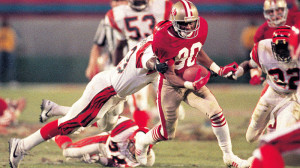
While Joe Montana led the 49ers to the game winning drive in Super Bowl XXIII, Jerry Rice was named the MVP.
10. Jerry Rice – San Francisco 49ers – Super Bowl XXIII – 11 rec., 215 yards, 1 TD
The greatest receiver in NFL history was a dominant presence in several Super Bowls, but he was at his best during Super Bowl XXIII against the Cincinnati Bengals. His 11 receptions are still tied for the most in Super Bowl history and his 215 receiving yards remain a record. On the famous final 92-yard drive to victory, Rice caught three passes for 51 yards, including a key 27-yard catch to get deep into Bengals territory.
9. Troy Aikman – Dallas Cowboys – Super Bowl XXVII – 22-30, 273 yards, 4 TD 0 INT; 3 rushes, 28 yards
Super Bowl XXVII eventually became a blowout due to nine turnovers by the Buffalo Bills. However, before the game got out of control, Troy Aikman and the Dallas offense had already knocked Buffalo into submission. Aikman tossed three touchdown passes in the first half to lift Dallas to a 28-10 halftime lead. He added a fourth touchdown pass early in the fourth quarter to put the game out of reach.
8. Steve Young – San Francisco 49ers – Super Bowl XXIX – 24-36, 325 yards, 6 TD, 0 INT; 5 rushes, 49 yards
Prior to leading the San Francisco 49ers to Super Bowl XXIX much had been made of the fact that Steve Young had not duplicated the Super Bowl success of Joe Montana. While Young would ultimately only lead the 49ers to one Super Bowl win, his performance against the San Diego Chargers was among the greatest ever. He tossed four touchdowns in the first half and eventually eclipsed Montana’s previous Super Bowl record by throwing six touchdown passes.
7. Doug Williams – Washington Redskins – Super Bowl XXII – 18-29, 340 yards, 4 TD, 1 INT
It didn’t look good for Doug Williams and the Washington Redskins early in Super Bowl XXII. The Denver Broncos jumped to a quick 10-0 lead and Williams briefly left the game late in the first quarter after tweaking his knee. However, the injury proved to be minimal and Williams and the Redskins roared back in the second quarter to have the most dominant quarter in Super Bowl history. Williams tossed four touchdown passes in the quarter as the Redskins scored a record 35 points. In the second half the Redskins relied primarily on the run, but Williams still finished with some of the finest numbers in Super Bowl history.
6. Tom Brady – New England Patriots – Super Bowl XLIX – 37-50, 328 yards, 4 TD, 2 INT
With the Patriots trailing 24-14 entering the fourth quarter, Tom Brady showed why he is part of the discussion for greatest clutch quarterback of all-time. Despite having basically no running game for the best defense in the NFL to worry about, Brady completed 13 of 15 passes for 125 yards and two touchdowns as the Patriots stormed back to win 28-24. He matched Joe Montana as a three-time Super Bowl MVP.
5. Phil Simms – New York Giants – Super Bowl XXI – 22-25, 268 yards, 3 TD, 0 INT
The New York Giants reached Super Bowl XXI primarily because of a dominating defense, but in the Super Bowl they were able to distance themselves from the Denver Broncos in a large part due to the near-perfect performance of quarterback Phil Simms. His 88% completion percentage remains the best in Super Bowl history and he led a key touchdown drive early in the third quarter to give the Giants a lead they would not relinquish.
4. Terry Bradshaw – Pittsburgh Steelers – Super Bowl XIII – 17-30, 318 yards, 4 TD, 1 INT
When the Dallas Cowboys and Pittsburgh Steelers met in Super Bowl X, Terry Bradshaw was a secondary character and most Pittsburgh fans just hoped he didn’t do anything to cost the team the victory. By Super Bowl XIII, Bradshaw had emerged as a leading man and the game was billed as a “battle” between Bradshaw and Roger Staubach. While both quarterbacks played at a high level, Bradshaw and the Steelers emerged with the victory and Bradshaw was named the MVP.
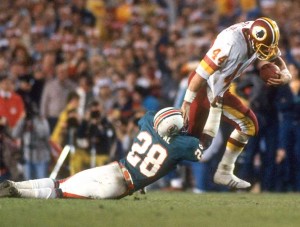
The broken tackle and fourth down touchdown run by John Riggins in Super Bowl XVII is one of the biggest plays in Super Bowl history.
3. John Riggins – Washington Redskins – Super Bowl XVII – 38 rushes, 166 yards, 1 TD
Capping an amazing playoff run in which John Riggins rushed for 610 yards in four games, the “Diesel” gained a then Super Bowl record 166 yards to lift the Washington Redskins past the Miami Dolphins. His 43-yard touchdown run on fourth down in the fourth quarter proved to be the game winner and is one of the iconic plays in Super Bowl history.
2. Marcus Allen – Los Angeles Raiders – Super Bowl XVIII – 20 rushes, 191 yards, 2 TD; 2 rec., 18 yards
In a game that was expected to be close, but ended up as a blowout, Marcus Allen was the best player on the field. He established a new Super Bowl record with 191 yards rushing and averaged 9.55 yards per carry. He scored two touchdowns in the third quarter and his 74-yard cut-back run was the final nail in the coffin for the Washington Redskins.
1. Joe Montana – San Francisco 49ers – Super Bowl XXIII – 23-36, 357 yards, 2 TD, 0 INT
It is interesting that Joe Montana won three Super Bowl MVP Awards, but the performance picked as his best (and the best of all-time in a Super Bowl) is for the one game in which he did not receive that award. Yet, in hindsight there seems little doubt that Super Bowl XXIII was the most masterful performance of Montana’s career and arguably of all-time. Held in check for three quarters, Montana led the 49ers on an 85-yard touchdown drive to tie the game at 13-13 early in the final period. Then, after the Bengals had taken a 16-13 lead, Montana was put in exactly the situation that NFL fans had been waiting for in a Super Bowl for many years: the best quarterback, leading the best team down the field to win the Super Bowl in the final minutes. Their 92-yard drive was a thing of beauty as Montana completed eight of nine passes for 97 yards (a penalty pushed the 49ers back 10 yards during the drive) and the game-winning touchdown pass to John Taylor. Though Montana and the 49ers won their fourth Super Bowl the following year, considering that this was the final game under the guidance of longtime head coach Bill Walsh, it is arguable that the last second Super Bowl win is the pinnacle moment for the 49ers of the 1980s.

